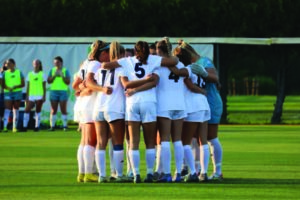When playing sports in middle school and high school, there are always discussions on the chemistry of the team and how this affects the performance of the team as a whole. This is an important issue at that level, all the way up to the professional level. When watching a sporting event, it’s obvious to the audience when the chemistry of a team is off: missed passes, players being off their position — just general miscommunications. Sometimes, this is an element forgotten about in college sports.
Almost everyone knows that team chemistry is an important part of the sport, but many times people forget about this when they are playing intramural or club sports. For any college students who don’t play division one sports, intramural and club teams are their way to stay active on a sports team. Even though these sports aren’t necessarily as competitive as other teams at the institution, their chemistry isn’t any less important. In order for the team to succeed as a unit, it is important to have a healthy team dynamic. A trust in one another.
The sport itself is often what brings these teams together, but many times it is the chemistry of the team that is cited as the most important element working toward keeping athletes competitively playing as a group. And even for those teams where it does not seem to be as important of an ingredient, chemistry is integral. Many teams create this chemistry through team bonding events, such as socials and holiday themed celebrations and fundraising events. For others, it’s something more organic.
One element of this that is often forgotten in practice is attendance. There is no arguing that college is a busy time — and it may sometimes seem that there are barely enough hours in the day to get everything done. This is not an excuse to not attend practice for a team that you are a part of. These practices are the times when you work on skills as a whole, get to know each other and find that chemistry specific to the game. Being friends off the field is completely different from being able to have the kind of relationship needed to be able to succeed as a team.
Think of a hockey team. This is one of the sports that requires a significant amount of team chemistry. Without team unity, passes will be missed, players will be in the wrong position, there might even be too many players on the ice.
This happens often, even at the division 1 level. Teams get penalties for too many players on the ice, miss scoring opportunities due to missed passes and players who have no idea what their teammates are doing. This is a problem that is common on a new team, or teams who have not been playing together long. For intramural and club sports, many of whom have a brief season, leave little time to develop the chemistry they need to be successful, this may be the reason for a lack of success.
Despite the level of competition, team chemistry is almost as important as general knowledge and skill of the sport and can not be something that is forgotten. Whether this requires more team bonding events outside of practice, more time spent at practice on drills to help players feel comfortable together, or more time at practice in general, this is something that every team needs to address.







